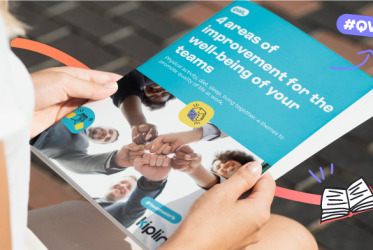
When companies invite their employees to eat well
Food and health. A new topic for companies
“An annual nutritional assessment, reimbursable by social security or mutual insurance companies, could be a strong measure to democratize the implementation of a diet favorable to the health and well-being of employees”, this proposal is part of the many recommendations of the Spinoza Think-Tank, which is behind the Positive Health study (January 2022 – 400 pages).
In France, almost one adult in two is overweight or obese. More than 8 million adults are affected by obesity. This figure has doubled in 20 years (study of the national league against obesity – June 2021).
This public health issue concerns more and more companies. This is a complex subject, because beyond diet, the causes of overweight or obesity are multifactorial (genetic, psychological, environmental, social…).
Well-being, improvement of the quality of life, prevention of certain pathologies… “Eating well” is one of the determinants of health, just like physical activity or sleep.
For the network of actors of the National Nutrition and Health Program (PNNS), a French reference for companies that engage in actions on nutrition: “Investing in the implementation of nutrition actions in companies can be amortized by the reduction in the number of days of sick leave and work accidents.”
How to help company employees to better understand what they eat?
In Alsace, the Occupational Health Service (SST) has published a practical guide to help companies act on nutrition for the well-being of their employees. The same goes for AG2R La Mondiale, which has published a “Nutrition Guide” available online to provide useful information on healthy eating practices.
Connected refrigerators and responsible company restaurants
To go beyond information tools and awareness campaigns, new solutions are making it possible to improve the quality of the meals offered during the lunch break.
Connected fridges are making their way into company corridors. Accessible on a self-service basis using a card (RFID), these fridges contain jars of fresh and balanced meals delivered every day. Each employee can help himself or herself with an RFID card and a system for recharging credits that is done online. Melchior, Popchef or Pikizy, several young companies offer this type of “digital canteens”.
For traditional company restaurants, “Mon Restau Responsable” offers a free tool designed to support collective restaurants that wish to offer their guests healthy, quality and environmentally friendly food. It begins with an easy-to-use self-assessment questionnaire, establishing a diagnosis of the strengths and areas for improvement of a collective restaurant.
Safran, L’Oréal Campus Aulnay, CARSAT Normandie and the Poitiers University Hospital have all joined the initiative.
Other initiatives exist, such as the “PNNS active companies” charter. The signatory companies undertake to implement a minimum of three actions each year, including: food supply, physical activity, information/education, training, facilitating the management of nutrition-related diseases, etc.
Each of these actions will help limit the consumption of ultra-processed products (cosmetic additives, preservatives, etc.), which account for nearly 70% of the food sold in France, according to figures from the Santé Positive study.
Games and workshops to change behavior
Gamification is also used to encourage changes in employee behavior regarding food.
For example, the CPAM Haute Garonne (one of the many branches of France Social Security) invited its employees to a “Food Good Game” where each team had to propose a balanced menu that was good for the planet by calculating the carbon impact of the menu using an eco-calculator. A point system is awarded according to the environmental impact and the nutritional quality assessed by a dietician from the organization’s prevention department and the occupational health department. The winning team’s menu is then offered for tasting in the company restaurant.
Finally, dietary workshops are often among the first actions implemented. Groupama, Airbus, Ikea and France Télévision have already called on the Les Ateliers Durables collective to help their employees adopt the right habits. Lidl also includes this type of dietary workshop (with preparation of Lunch boxes and participation of Michel Cymès, a famous French scientist) as part of its week entitled “Entre Nous, santé et sécurité”.
Eat well, sleep better and practice a moderate and regular physical activity. To take care of the physical and mental health of their employees, companies are focusing on this winning triptych. Preventive health actions that are now part of the new agreements on health at work (ANI).
